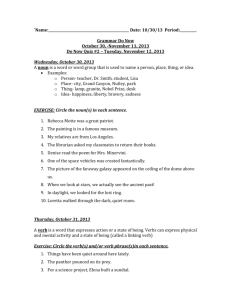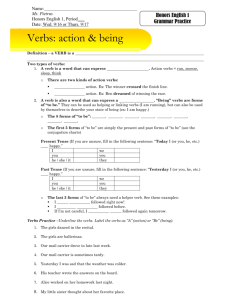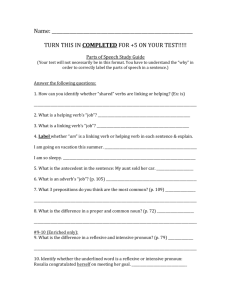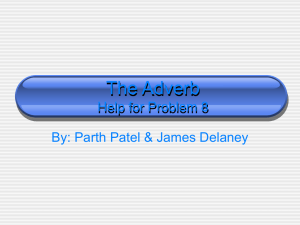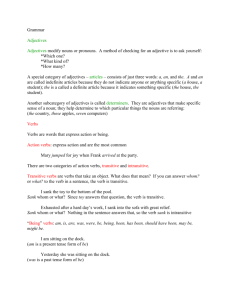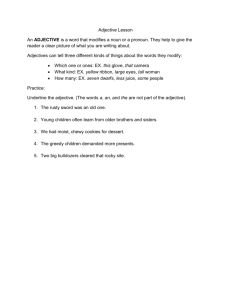IDENTIFYING VERBS AND ADVERBS
advertisement
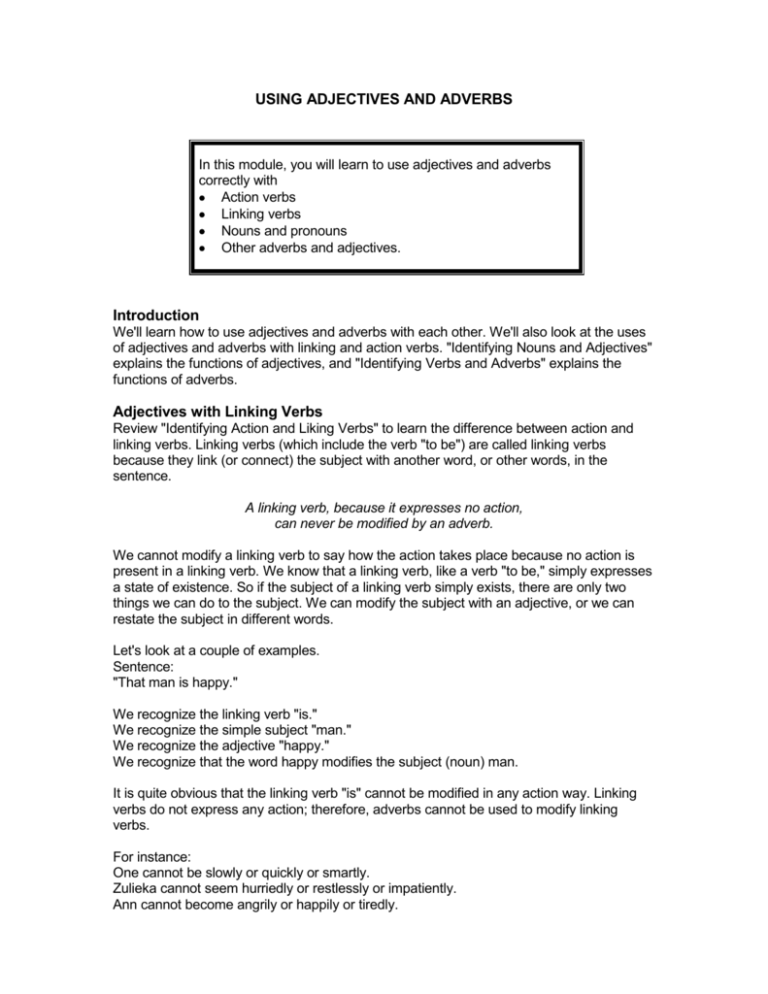
USING ADJECTIVES AND ADVERBS In this module, you will learn to use adjectives and adverbs correctly with Action verbs Linking verbs Nouns and pronouns Other adverbs and adjectives. Introduction We'll learn how to use adjectives and adverbs with each other. We'll also look at the uses of adjectives and adverbs with linking and action verbs. "Identifying Nouns and Adjectives" explains the functions of adjectives, and "Identifying Verbs and Adverbs" explains the functions of adverbs. Adjectives with Linking Verbs Review "Identifying Action and Liking Verbs" to learn the difference between action and linking verbs. Linking verbs (which include the verb "to be") are called linking verbs because they link (or connect) the subject with another word, or other words, in the sentence. A linking verb, because it expresses no action, can never be modified by an adverb. We cannot modify a linking verb to say how the action takes place because no action is present in a linking verb. We know that a linking verb, like a verb "to be," simply expresses a state of existence. So if the subject of a linking verb simply exists, there are only two things we can do to the subject. We can modify the subject with an adjective, or we can restate the subject in different words. Let's look at a couple of examples. Sentence: "That man is happy." We recognize the linking verb "is." We recognize the simple subject "man." We recognize the adjective "happy." We recognize that the word happy modifies the subject (noun) man. It is quite obvious that the linking verb "is" cannot be modified in any action way. Linking verbs do not express any action; therefore, adverbs cannot be used to modify linking verbs. For instance: One cannot be slowly or quickly or smartly. Zulieka cannot seem hurriedly or restlessly or impatiently. Ann cannot become angrily or happily or tiredly. But One can be slow or quick or smart. Zulieka can seem hurried or restless or impatient. Ann can become angry or happy or tired. Do you see how, in the last three sentences, the adjectives are connected to the subject? The adjectives modify the nouns and pronoun that make up the subjects. Procedure When you need to decide which to use--an adjective or an adverb--after a verb, the key is to determine whether the verb is action or linking. To determine this, try the following procedure. Sentence: "Tom looked (surprised, surprisingly) when they called his name." 1. Identify the verb. We recognize "looked" as the complete verb. To determine whether the complete verb is action or linking ask: 2. If Tom "looked," is there an action? No, there is no physical or mental action in the verb. The verb "looked" names a state of existence. Solution The complete verb is the verb "looked." Looked is a linking verb. Therefore, an adjective must follow a linking verb. Of the choices within parentheses, "surprised" is the adjective form, so we choose "surprised" as the correct form. In addition, the adjective "surprised" modifies the noun "Tom." And we know an adjective is the only part of speech that can modify a noun, so our choice must be correct. Sentence: "Tom looked (suspicious, suspiciously) at his empty wallet." We recognize "looked" as the complete verb. There is a physical action of looking. Solution The complete verb is the verb "looked," an action verb. The words within parentheses (suspicious, suspiciously) are intended to modify the verb. Only an adverb can modify an action verb. Of the choices within parentheses, "suspiciously" is the adverb form, so we choose "suspiciously" as the correct modifier. Sentence: "Teresa has always believed (strong, strongly) in the power of suggestion." We recognize "has believed" as the complete verb. There is a mental action of believing. Solution The complete verb "has believed" is an action verb. The choices (strong, strongly) are intended to modify the verb. So we choose the adverb "strongly" to modify the action verb. Review "Identifying Action and Liking Verbs" if you wish to see a comprehensive list of action/linking verbs. However, do not assume that an adverb can never follow a linking verb. As proof, try the following question. Question: Select an answer that correctly identifies the main verb, the main verb as linking or action, and the correct word choice. Sentence: "The chairwoman seems (particular, particularly) biased in her views about voting rights." 1. Seems, action, particularly 2. Biased, action, particularly 3. Seems biased, linking, particular 4. Seems, linking, particularly The verb is "seem," a linking verb because there is no action of any sort. But we cannot select the adjective "particular" because the words within parentheses are intended to modify the adjective "biased." Only an adverb can modify an adjective. Thus, we must select the adverb "particularly." So 4. "Seems, linking, particularly" is the correct response. Analyze how the word functions in the sentence before deciding on a response. Adverbs An adverb is a word that modifies a verb, another adverb, or an adjective. In this section, we investigate adverbs and how they function with verbs, adjectives, and other adverbs. Adverbs with Verbs Some of the things an adverb can tell about how a verb/action takes place are listed below. Let's use the list to construct sentences in which we modify the verb with an adverb. List: How often (she spoke) Add an adverb: She spoke regularly. In what manner (he wrote) Add an adverb: He wrote convincingly. In what place (Joan sat) Add an adverb: Joan sat here. At what time (Farook left) Add an adverb: Farook left early. Adverbs with Adjectives By adding an adverb to an adjective, we change the intensity of the adjective. Let's use the list of what adjectives can tell us about nouns and add some adverbs to see how those adjectives become more exact. List: What colour (a red sweater) Add an adverb: a garishly red sweater How many (12 volunteers) Add an adverb: only 12 volunteers It's obvious that the addition of an adverb to an adjective intensifies the adjective and makes it more exact. Adverbs with Adverbs We can also add an adverb to another adverb to intensify the first adverb. List: How often (ran often) Add an adverb: ran quite often In what manner (arranged haphazardly) Add an adverb: arranged highly haphazardly In what place (sat here) Add an adverb: sat right here At what time (arrived late) Add an adverb: arrived predictably late We can see that adding adverbs to modify other adverbs intensifies and adds exactness to the original adverb. Exercises Select an answer that correctly identifies the main verb, the main verb as linking or action, and the correct word choice. The answers appear after the last question. 1. The parcel was lost (accidental, accidentally) after arriving at our warehouse. A. Lost, action, accidentally B. Was, linking, accidental C. Was lost, action, accidentally D. Arriving, linking, accidental 2. The strikers want (desperate, desperately) to talk with the negotiating team. A. Want, action, desperately B. Want, linking, desperate C. To talk, action, desperately D. Talk, action, desperately 3. The newly baked cake smelled as (good, well) as my mother's cakes. A. Baked, action, well B. Baked, linking, good C. Smelled, action, well D. Smelled, linking, good 4. The women standing near the cash looked (suspicious, suspiciously) to the undercover police officer. A. Looked, action, suspiciously B. Standing, action, suspiciously C. Standing, linking, suspicious D. Looked, linking, suspicious 5. Sufiah had appeared (certain, certainly) to be offered the job at the bank. A. Had, action, certainly B. Appeared, action, certainly C. Had, linking, certain D. Appeared, linking, certain Select an answer that offers the correct justification for your word choice from within the parentheses. 6. She was surprised by the (unexpected, unexpectedly) standing ovation from the audience. A. Unexpectedly, an adverb, because it modifies the verb was surprised. B. Unexpected, an adjective, because it modifies the noun standing ovation. C. Unexpected, an adjective, because it modifies the verb was surprised. D. Unexpectedly, an adverb, because it modifies the verb standing. 7. Benjamin's cause deserves our (wholehearted, wholeheartedly) and undying support. A. Wholeheartedly, an adverb, because it modifies the verb deserves. B. Wholeheartedly, an adverb, because it modifies the verb undying. C. Wholehearted, an adjective, because it modifies the noun support. D. Wholehearted, an adjective, because it modifies the noun cause. 8. (Real, really) reliable friends are worth their weight in gold. A. Really, an adverb, because it modifies the adjective reliable. B. Really, an adverb, because it modifies the verb are. C. Real, an adjective, because it modifies the noun friends. D. Real, an adjective, because it modifies the adjective reliable. 9. The school play was both interesting and (extreme, extremely) well produced. A. Extreme, an adjective, because it modifies the noun play. B. Extremely, an adverb, because it modifies the adjective well. C. Extremely, an adverb, because it modifies the verb produced. D. Extremely, an adverb, because it modifies the adverb well. 10. The car looked (exceptional, exceptionally) good for its age. A. Exceptionally, an adverb, because it modifies the verb looked. B. Exceptionally, an adverb, because it modifies the adverb good. C. Exceptionally, an adverb, because it modifies the adjective good. D. Exceptional, an adjective, because it modifies the noun car. Answers 1, A. 2, A. 3, D. 4, D. 5, D. 6, B. 7, C. 8, A. 9, D. 10, C.



